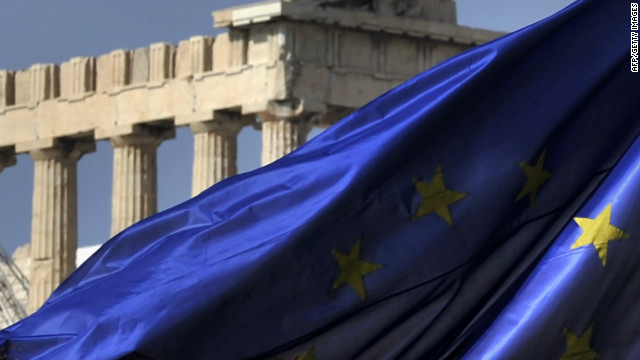Why it's too late to save Greece's sovereignty
January 30, 2012 -- Updated 1728 GMT (0128 HKT)
Yanis Varoufakis says Greeks are horrified at the prospect of losing national sovereignty.
STORY HIGHLIGHTS
- German and Greek politicians are at odds over who should control Greece's budget
- Greek political economist Yanis Varoufakis says both are guilty of failing to grasp the real problem
- Varoufakis says both countries mislead voters in agreeing an unsustainable rescue package for Greece
Editor's note: Yanis Varoufakis is professor economic theory at the University of Athens and author of "The Global Minotaur: America, the true causes of the financial crisis and the future of the world economy."
Athens, Greece (CNN) -- German leaders are furious with Greece. Yet again they have to go back to their electorates asking for more billions to throw down the black hole that is the Hellenic Republic. They have now become so angry that they are even openly proposing that Greece's fiscal affairs be deferred to some European Commissioner, preferably one of a Teutonic disposition.
Greek leaders, meanwhile, have seized upon this German "transgression" with glee. For it offers them a wonderful excuse to put on domestic display their patriotic fervor at a time when they are running low on legitimacy in the eyes of a battered, demoralized electorate.
Beating their chests about the German threat to Greece's national sovereignty, they are hoping that the Greeks will somehow forget that it was they, their leaders, who ceded sovereignty to the so-called troika of the European Commission, the International Monetary Fund and the European Central Bank.

Yanis Varoufakis
This is a typical case of a shady coalition of vested interests that is disintegrating under the weight of its collective hubris. For the past 18 months, German and Greek leaders have been working together to deny the truth about three simultaneous bankruptcies: The irreversible bankruptcy of the Greek state, the effective insolvency of many Franco-German banks, and, last but not least, the unsustainability of the euro-system as we know it.
To keep these truths from surfacing, German and Greek politicians, each for their own purposes, settled on gigantic loans for Greece that would act as plaster on the festering wounds of the aforementioned bankruptcies.
But to get these "historic" loans through the parliaments of Berlin and Athens, they had to be portrayed as a form of humanism; as German solidarity to the Greek people. Alas, to extend such "solidarity," German lawmakers demanded subsidiarity; which is euro-speak for the recipient agreeing to a tough reform agenda, complete with strict fiscal targets. In plain language, the huge loans would only be granted if similarly lofty promises were made by the Greek government.
Greece's agreed targets would be equivalent to my promising to break the world 100-meter sprint record in the forthcoming London Olympics.
Yanis Varoufakis
Yanis Varoufakis
Thus, German leaders, unwilling to confront their bankers and the fault lines developing throughout the eurozone, pretended to believe that the problem was Greece and that Greece could be "cured" by means of loans and austerity. At the same time, Greek leaders, unwilling to confront their electorate, pretended to believe that they could deliver the targets demanded by Germany.
Of course, it was only a matter of time before reality caught up with both sets of leaders. Once it became abundantly clear that the targets Greece had committed to were well and truly unrealistic, the coalition between our German and Greek leaders became testy. The knives are out and, if it were not for an equilibrium of terror at the thought of a euro-system collapse, a disorderly brawl would be plain for all to see.
The worst part of this sad saga is that public debate is still failing to keep track with the real issues. Instead of coming to terms with the structural imbalances within the eurozone, the Germans accuse the Greeks of incompetence, corruption and a singular failure to meet "their" targets.
The Greeks, meanwhile, are replying with references to World War II and yelps of horror at the prospect of violations of national sovereignty. Neither side is willing to admit that the whole rescue package was flawed from the outset. No serious consideration is given to the plain facts:
•That the cascade of insolvencies in the eurozone should never have been treated like liquidity problems fixable by loans to the bankrupt banks and states.
•That it is always a terrible idea to make large loans to an already shrinking economy conditional on further reduction in the national income from which these loans must be repaid (for this is precisely what hefty austerity measures in the middle of a recession achieve).
•That Greece's agreed targets would be equivalent to my promising, perhaps under duress, to break the world 100-meter sprint record in the forthcoming London Olympics.
The punishment of any big lie is its revelation. Unfortunately, we are not there yet.
The preordained failure of the Greek "program" has not yet exposed our leaders' connivance. It is, instead, generating Teutonic wrath among the hard working Germans (whose living standards have been under constant pressure for a decade, and who are now told they must guarantee even more zillions for the Greek state) and unbearable Sisyphean pain for Greeks caught up in a vicious cycle (from which no amount of hard work or innovative thinking can help them escape).
Something must give. If it is not our leaders' insidious lie, it will be the eurozone. It's that simple.


Δεν υπάρχουν σχόλια:
Δημοσίευση σχολίου
Σημείωση: Μόνο ένα μέλος αυτού του ιστολογίου μπορεί να αναρτήσει σχόλιο.